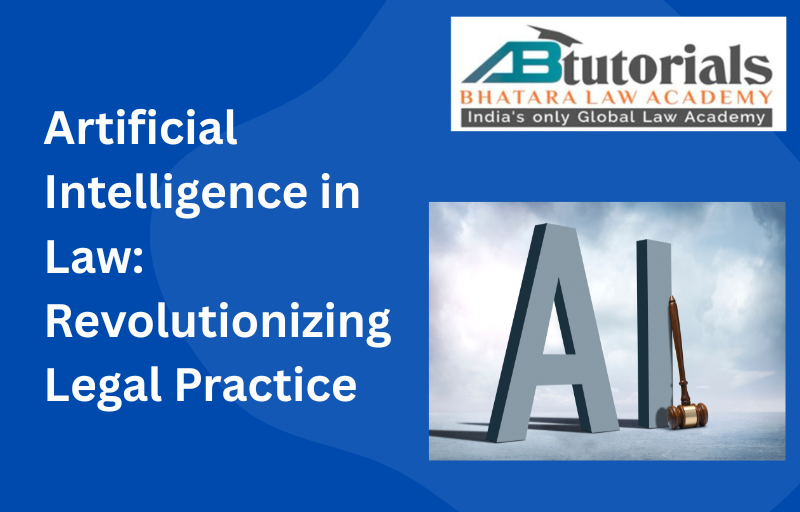Artificial Intelligence in Law: Revolutionising Legal Practice
By ABT Team
17 Jun, 2025

Artificial Intelligence is the new wave sweeping across various industries, and the law is no exception. With its ability to process vast amounts of data quickly and accurately, AI is changing the way attorneys conduct research, manage cases, and interact with clients. As technology continues to evolve, legal professionals need to understand these changes to stay ahead in the industry.
Revolutionising Legal Research
AI has revolutionised legal research, which was once time-consuming. Traditionally, lawyers spent hours upon hours reading case law, statutes, and other legal documents. Now, all this can be done in a matter of seconds with the help of AI, as it uses algorithms to identify key statutes, precedents, and relevant insights.This not only accelerates the research process but also enhances its accuracy. An AI system can find patterns and associations that even a very diligent human researcher might miss, thus no important detail is ever missed. By using these tools, attorneys will have more time for strategy and analysis of cases and less time shovelling paper.
Simplifying Routine Activities
AI also makes most of the tedious, time-consuming work that has always been a part of legal work easier. With AI-driven software, tasks such as document drafting, contract reviews, and billing management can be carried out much more efficiently. For example, such tools can produce drafts of legal documents using templates or other inputs to reduce the manual time spent.AI tools are also very effective in contract analysis, where they can quickly point out potential risks or areas of concern. Automation of these processes not only increases efficiency but also reduces the likelihood of human error, thus ensuring higher standards of quality in their work.
Enabling Better Decision-Making through Predictive Analytics
Another area in which AI is revolutionising the practice of law is through predictive analytics. Analysing historical case data, AI tools can predict probable outcomes for cases currently under adjudication. This data helps lawyers determine whether to litigate, settle the case, or pursue alternative courses of action.For instance, some courts are now starting to use AI in determining whether an individual is likely to reoffend while being granted bail or sentenced. Such a practice is raising pertinent ethical questions regarding the bias in AI models, but it also showcases how such tools can be supportive of more informed decision-making throughout the legal system.
Improving Client Communication
AI is transforming how lawyers engage with clients. Virtual assistants and chatbots powered by AI can handle initial inquiries, schedule meetings, and provide basic legal guidance around the clock. This level of accessibility enhances the client experience while freeing lawyers to focus on more complex legal matters.Another critical advantage of AI is that lawyers can update case developments or changes in relevant laws in real-time, thus improving transparency and building trust between attorneys and their clients. These technologies enhance communication and productivity, which would help strengthen attorney-client relationships.
Navigating Ethical Considerations
While the implementation of AI technology has many positive implications for lawyers, it does pose ethical considerations. Data privacy, algorithmic bias, and job displacement issues are some concerns that firms have to address in implementing these technologies.Moreover, AI, though it increases efficiency and accuracy, can never replace the fine judgment and critical thinking of an experienced attorney. A human touch is required in complex legal matters, for no algorithm can replicate the depth of experience and understanding brought to the table by lawyers.
Conclusion
This is assuredly transforming the practice of law, making it more efficient in research, automating routine tasks, and improving interactions with a greater percentage of clients, but with it comes ethical responsibilities that firms need to navigate very carefully. For lawyers at all levels, embracing AI while continuing to adhere to the precepts of ethical practice is what will enable them to thrive within this evolving landscape. By using technology responsibly, the legal community can address complex issues and progress further in the practice of law.Recent Articles
-
17 Jun, 2025
Artificial Intelligence in Law: Revolutionising Legal Practice
By ABT Team
-
10 Jun, 2025
How to Build a Career in Environmental Law in India: Addressing Ecological Challenges through Legal Avenues
By ABT Team
-
03 Jun, 2025
LEGAL AID FOR MARGINALIZED COMMUNITIES: BUILDING A CAREER IN PRO BONO LEGAL SERVICES
By ABT Team
-
29 May, 2025
The Role of Lawyers in Social Justice Movements: Careers in Human Rights Law and Public Interest Litigation
By ABT Team
-
27 May, 2025
Becoming a Public Prosecutor in India: Roles, Responsibilities, and Career Path
By ABT Team
-
20 May, 2025
Data Privacy and Cybersecurity Laws in India: Career Prospects in an Increasingly Digitalized Economy
By ABT Team
-
15 May, 2025
Legal Obligations of Indian Educational Institutions: Student Rights and Compliance Ensuring
By ABT Team
-
13 May, 2025
"Navigating Internships in India: Legal Requirements and Practical Challenges for Law Students"
By ABT Team
-
08 May, 2025
Funding Your Future: A Guide to Scholarships for Law Students in India
By ABT TEAM
-
06 May, 2025
Pro Bono Work: A Catalyst for Empathy and Practical Legal Skills in Law Students
By ABT TEAM

